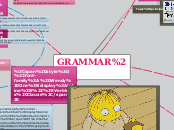GRAMMAR IV
Topic principal
Non-finite clause
Finite and non-finite verbs & clauses
Finite verbs indicate tense
Non-finite verbs don't indicate tense
There are four types
Infinitive
Ex. To graduate, I need to study hard.
Participle
Ex. Once made, the decisión is final.
Verbal noun
Ex. I keep on hearing funny noises.
Gerund
Ex. When cooking the meal, I cut my finger.
Verbless Clause
This kind of clause has no verb in it
EX. Come next week if possible
Ex. Now much better, she could smile.
Both non-finite and verbless clause, can function as a noun and adverbial clauses. In addition, they have the same function in sentences as subordinate clauses
Ex. Painting the kitchen will take ages (non-finite clause as subject)
Ex. While in town, I met your mum (verbless clause as adjunct, saying when)
Non-finite clauses are used to form
INDIRECT COMMANDS
'Don't do that,' I said to her (direct command)
I told her not to do that (indirect command)
Dangling Participles
Participle in a non-finite clause whose implied and unexpressed subject is not the same as the subject of the verb in the main clause
Ex. I don't want you to do that (expressed subject)
Ex. I don't want to do that (unexpressed subject)
When there is no expressed subject in a non-finite or verbless clause, the implied subject is the subject of the verb in the main clause
Ex. I don't want to do that (the implied subject of 'to do' is 'I')
Phrases and Clauses
A phrase does not have a subject and a verb, whereas a clause does
For this reason, non-finite and verbless clauses are treated as phrases in traditional grammar
But there are two reasons for not doing that
They can be expanded into a full clause with a finite verb
While running for the bus, I slipped on the ice = While I was running for the bus, I slipped on the ice.
They generally have words with more tan one sentence function
I don't like Peter / doing / that (Subject + verb + D.O)
COLLOCATIONS
Pair or group of words that are often together
They help us sound natural
They give us an alternative way to say something
They help improve style in writing
Some combinations just sound wrong for L1 people
Some are strong and fixed
Types of collocations
Adjective + Noun (Bright color)
Verb + Noun (Make a fuss)
Noun + Verb (The company has grown)
Noun + Noun (A sense of pride)
Verb + Prep (Filled with anger)
Verb + Adverb (Whisper softly)
Adverb + Adjective (Happily married)
Compounds and idioms
Compounds are units of meaning formed with two or more words, separated for a hyphen or written as one
They can be guessed by knowing the meaning of the individual words
Here's a catchy and funny way to explain this topic
Idioms are a group of words in a fixed expression that cannot be guessed
Here are some examples
Subjunctive Mood
Explained in detail
The Subjunctive mood expresses wishes, conditions contrary to fact, and requests and commands
Present subjunctive
There are two main uses
Past subjunctive
Hypothetical meaning
Mandative subjunctive
Used in That-clauses after an expression of such notions as
Demands
Recommendations
Proposal
Intentions
This use is more characteristic of AmE
The teacher demanded that we do our homework during class
This structure may be unsual and difficult at first sight, but once you understand it
Operative Subjunctive
Used in fixed expressions
A toast now: long live the bride and groom.
If I have to pretend that you no longer exist, so be it.
Be that as it may
God save the Queen
Used in conditional and concessive clauses
Also used in subordinate clauses after wish and suppose
If I were you, I would apply right now (I am not you)
I wish the journey were over (It's not over)
I wish you were here (You are not here)

Unreal situations
Unreal time
It's time, it's high time
These are followed by past simple or continuous, though the time referred to is unreal
It's time I went home now
It's high time we were heading home now
Wishes
Present/future time
These are wishes where we want to change a present/future state
Ex. I wish I had a car (I don't have one now)
Here's another past form
Ex. I wish you weren't leaving (You're leaving now)
Would
Used when the speaker wants somebody or something else to change
Ex. I wish he would change his mind and see me like something else
Its use often describes an annoying habit
Ex. I wish you wouldn't be so noisy
Past time
As with present wishes, the verb form after wish is one stage further back in the past. These are wishes referring to a past event that cannot be changed
Ex. I wish I hadn't eaten so much
This use of wish is common after If only to express regrets
Hope
This expresses wishes about simple future events
Ex. I hope it doesn't rain tomorrow
I'd rather / I'd prefer
Followed by a clause
I'd rather is followed by past verb forms (same as in wishes about the present), and it expresses preference about actions
Ex. I'd rather you didn't smoke in here
I'd rather and I'd sooner are used with normal verb forms when comparing nouns and phrases
Ex. I'd rather study Music than Literature
I'd prefer can be used in the same way, but in this kind of sentence has an object it
Ex. I'd prefer it if you didn't go
However, I'd prefer is not followed by an unreal verb form in other situations
As if / As though
Can be real and unreal
The verb form depends on whether the situation is real or not
Ex. You look as if you're having a headache (true, he is having a headache)
Ex. You look as if you've seen a ghost (Unreal, he's just scared because something bad happened)
The more colloquial like is, it doesn't requiere the verb form change
Ex. You look like you've just seen a ghost (informal)
Ex. You look as you've just seen a ghost (formal)
Suppose / Imagine
Understood conditions: The conditional part of this kind of sentences is often understood but not stated
Ex.Imagine you won the contest!
Ex. Suppose your crush declared his love for you
If the event es referred to a real possibility, a present form is possible
Ex. Suppose you miss the train
Topic flotante
Hope you liked it!


